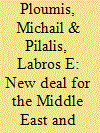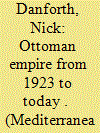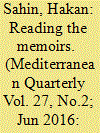| Srl | Item |
| 1 |
ID:
146831


|
|
|
|
|
| Summary/Abstract |
This essay seeks to explain the source and magnitude of change in Turkish foreign policy during Turgut Ozal’s premiership. In doing so, it employs theoretical studies on foreign policy change and the role of the leader in such processes. The essay argues that Prime Minister Ozal assumed the role of the authoritative leader in Turkey’s foreign policy decision making, which was the main source of change in that period’s foreign policy. Further, it demonstrates that during the period from 1983 until 1989 there were changes in the level of effort as well as shifts in the methods and aims of Turkish foreign policy. Nevertheless, this period did not witness any comprehensive or fundamental changes at the level of international orientation.
|
|
|
|
|
|
|
|
|
|
|
|
|
|
|
|
| 2 |
ID:
146832


|
|
|
|
|
| Summary/Abstract |
The scale of the migrant crisis took Europe by surprise in 2015, but 2016 promised to be far worse. Europe dithered on how to respond, confusing the demands of compassion with migrant relocation policy and failing to recognize Greece’s inability to resolve the crisis independently. Pioneering academic work on refugees and assimilation limns the essential choices policy makers have: (1) throw open the gates to Europe and hope new Muslims citizens will eventually assimilate, (2) exclude Muslim immigrants and try to subordinate Islamic beliefs to European norms for those already in Europe, or (3) test whether Islamic countries are able and willing to support the current international liberal order, including freedom of conscience on matters of faith. Greece’s current weakness means it will have to accommodate whatever choice European leaders make.
|
|
|
|
|
|
|
|
|
|
|
|
|
|
|
|
| 3 |
ID:
146833


|
|
|
|
|
| Summary/Abstract |
Five years after the Arab uprisings in 2011, countries of the Middle East and North Africa (MENA) had difficulties finding their pathway to sustainable economic and political change. Arab oil-producing countries suffered from decreasing oil prices while the Arab non-oil-producing states struggled to provide better living conditions to their populations. Meanwhile, the war in Syria continued, the Islamic State (ISIS) was extending its efforts to establish a caliphate, and a massive influx of refugees was reaching Central Europe seeking asylum. In this context, it is imperative for Arab countries to establish substantial economic reforms in parallel with political change to enable their populations to remain in their homelands. The international community should support the MENA countries by introducing a “New Deal” to help lead to sustainable development and political change.
|
|
|
|
|
|
|
|
|
|
|
|
|
|
|
|
| 4 |
ID:
146829


|
|
|
|
|
| Summary/Abstract |
Since its demise, the Ottoman Empire has been repeatedly reinvented. This essay traces the diverse and often unexpected ways that Ottoman history has served divergent political agendas over the past century, exploring the empire’s progression from religious to secular to pious and from multicultural to Turkish to tolerant.
|
|
|
|
|
|
|
|
|
|
|
|
|
|
|
|
| 5 |
ID:
146830


|
|
|
|
|
| Summary/Abstract |
The military’s attitude toward the political realm is problematic in Turkey. While, on the one hand, it accepts the notion of civilian control, on the other hand, it has sometimes exercised tutelary functions or overtly intervened in politics. This essay argues that political thoughts of soldiers have an explanatory power in understanding this dilemma. It examines a set of more than 150 life narratives written by soldiers. Memoirs, autobiographies, and journals are relatively convenient means through which to explain one’s personal thoughts. An elaboration on those texts suggests that soldiers have an ambivalent perception of the political realm, and this serves as a basis for the legitimization of their political actions. The implicit idea that they are the ultimate guardians of the country is embedded in the fact that they are respectful of democracy and are in favor of civilian control in their discourses.
|
|
|
|
|
|
|
|
|
|
|
|
|
|
|
|